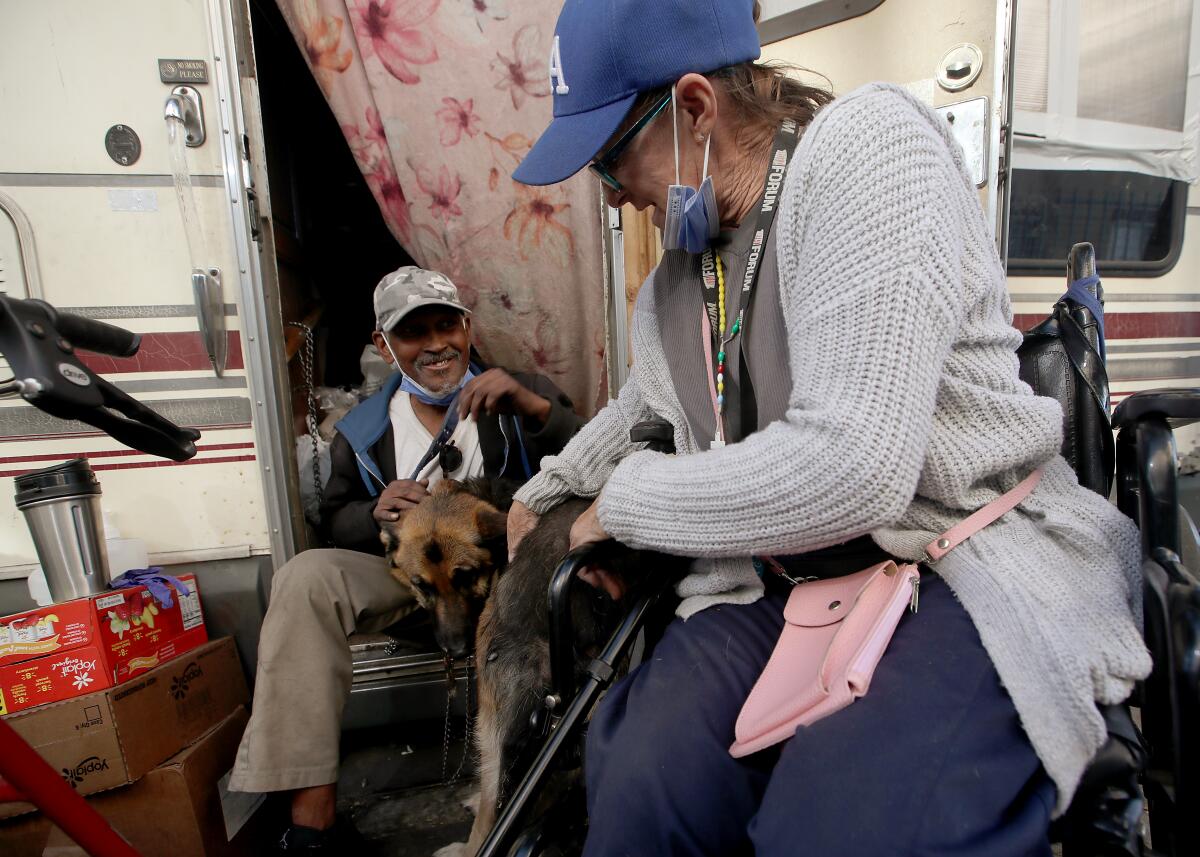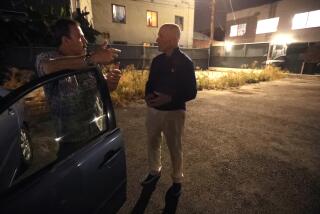Pride, loss and second chances: L.A.’s unsheltered take stock before giving thanks

All week, Patricia Ragland has anticipated celebrating Thanksgiving with her family. For the last two years, she has spent the day by herself, and like many Americans enjoying the holiday with a large gathering for the first time during the pandemic, she’s nervous and excited.
Walking into her sister’s home in Moreno Valley, she expects a lot of questions, a little tension perhaps, the typical undercurrents of judgment and concern. But for those who are homeless, like Ragland, expressions of love are sometimes hard to decipher.
“Where have you been?” she imagines they’ll ask, and she’ll share the good news. Since July, she’s been housed and is now staying in a motel on Western Avenue.
“We hope you don’t disappear again,” they’ll probably reply, trying to set her at ease. But that will hurt the most. She can’t help but feel like the auntie who once had everything and now has so little.
“I never thought it would be me,” she said. “One of my biggest fears is this.”
Thanksgiving, the start of the year-end holidays, is a day of reflection, but for the unsheltered, pronouncements of gratitude are not always easy. In Los Angeles, the homelessness crisis has grown more acute. Politicians make promises, agencies try to inspire hope, but for those whose lives are defined by the street, the past is a weight upon the future.
When Ragland lost her job in an assisted living facility in 2017, she was unable to pay rent on her apartment and ended up on the streets of South Los Angeles.
In January, she lost her 24-year-old son, JaiShahn, to diabetes, and two years earlier, a niece in a stabbing at a Mid-City nightclub. The two youngsters always lit up the room, and now they were gone.
Fighting back tears, Ragland, 45, tries to deflect the focus from her sorrow.
“It will still be a happy occasion,” she said, grateful for the family who has invited her and a dinner that will include the dressing that her sister makes from their mother’s recipe, her favorite.
Sitting down at the table, taking in the faces, the voices and cheer, Ragland knows she will whisper a brief prayer to herself.
“Don’t let the things we’ve gone through separate us any further,” she will say. “All we have is us. So just love each other hard and don’t let each other go.”
Sustained by memories
As familiar faces and mutual memories link many families on this day, Pablo Arroyos turns his thoughts to Mexico, where his wife and two young daughters now live. Their last Thanksgiving together was in 2019.
Life in America — a one-bedroom apartment in Temple City that they shared with a cousin — had become too difficult and too expensive for them, and now Arroyos is alone, living in his 1995 Chevy Blazer, sleeping on a thin mattress with a few pillows, surrounded by boxes filled with T–shirts and athletic shoes, canned peaches and baked beans, crates of water, toothpaste and toiletries.
The 43-year-old gardener has a few friends who are also homeless and live under a freeway overpass near the hotel where he parks his SUV in Arcadia. He tries to find work and believes that anything here is better than what he can get in Mexico.
“Most of the money I make I send back to my wife and children, which doesn’t leave me with enough for rent,” he said. “It can be lonely.”
He imagines they are getting ready for their special holiday, the feast of the Virgen de Guadalupe, on Dec. 9. He remembers the celebration from his childhood in a small village in eastern Mexico, where everyone gathered for Mass and shared meals: pork tamales, roasted goat with guacamole and tostadas, beans and salsa, gorditas stuffed with pork rinds, cheese and beans.
“We gathered from all over the state to be thankful for each other and to God,” he recalled.
But that was more than 22 years ago, and although the holidays bring a reminder of what he has lost, he takes solace in the generosity of others allowing him to stock up on food and supplies.
“Because it’s Thanksgiving and Christmas time, people are more giving,” he said. “I’m grateful for every item and every chance I’m given.”
He recently picked up a new pair of Nikes at St. Andrew’s Catholic Church in Pasadena and showered at All Saints Episcopal Church nearby. At Monrovia’s Foothill Unity Center, he picked up sugar cookies, Kings Hawaiian roles and canned vegetables.
On Thursday, he’ll eat at a shelter and donation center in Pasadena. As much as he’s looking forward to the meal, the company is more special.
“Talking to other people is really what I need more than food,” Arroyos said. “It feels good to share your stories, to feel human and not have people judging you. So, there are some good things with the holidays too.”
Kindness of strangers
When second chances come, they often mean a surrendering of pride. At the end of a special pre-Thanksgiving lunch, outreach workers with the Homeless Outreach Program Integrated Care System
in Los Angeles offered Larry Gray and Lorna Walker a little extra food to take home with them.
“I said no,” Gray said. “I didn’t feel good taking a plate home. I guess it was my pride.”
But he regretted his decision as soon as they got back to their motor home with its dead battery, broken fan belt — and no heater or running water — parked on 60th Place at Western Avenue.
Pride is what holds this couple together. They met almost two years ago at a neighborhood hangout, a shade tree five blocks away.
A former case manager for a mental health agency in Santa Monica, Gray, 60, survived a heart attack and double bypass in 2015, but when the pandemic hit, he lost the job.
Walker, 57, had been a phlebotomist but had to stop working once she was diagnosed with multiple sclerosis. When her husband died, she found an apartment, and when its owner sold the property, she got a relocation fee that she and Gray used to pay for the motor home.
Today they’re a familiar sight — him standing beside her in her wheelchair — visiting their small community church for the lunch on Tuesdays and a hot meal after the Sunday service. Mornings he’ll leave her with their German shepherd, Lady, while he walks to Starbucks for two cups of hot water for their Folgers and oatmeal.
They’re not certain what they’ll do on Thanksgiving. They have no children, and for Gray, the season is shadowed by the memory of his mother, who died almost 25 years ago.
Walker similarly recalls her father — “a good provider” — and her mother, who on special holidays baked individual cakes for her children. Hers would be lemon with lemon icing.
“Family members took care of family members,” she recalled. “I miss them both.”
They live on $1,000 a month and whatever extra cash Gray can make washing car windows, leaving them to rely on the generosity of others, which is why the HOPICS lunch last week was so special.
After a shower and clean clothes, they received a gift box with winter wear — gloves and a beanie — and they selected their meal from a menu: turkey, ham, dressing, collard greens topped off with cheesecake. Afterward, Gray twirled Walker in her wheelchair as they danced to “Black Magic Woman.”
“Even though we’re going through what we’re going through,” Walker said, “we can still thank God and be grateful.”
Gratitude and pride
Standing in a long line for the food giveaway on Saturday at the Long Beach Rescue Mission, John Wimberly took a moment to reflect on his life over the last 10 years. Once homeless and addicted to alcohol and cocaine, Thanksgiving meant nothing to him.
Then, a few days after New Year’s 2015 — a cold night at 3 a.m. — he was kicked out of Los Angeles’ Union Station. Wrapping himself up in a sleeping bag and blanket, he tried to sleep on a bench outside.
“I had nothing,” he said. “I had lost everything.”
Wimberly knew then that he had to get away from skid row or he’d end up dead from either drugs or homicide. He took the Blue Line to Long Beach and got a bed at a temporary shelter run by the mission he’d visited in the past whenever it handed out free pizza or burgers.
As he inched closer to the head of the line, he was glad that he no longer had to beg for money. He had an apartment that cost him $240 a month and a monthly disability check for $1,040. He had just gotten his associate degree from the local community college.
Once inside the mission with its tables of food neatly laid out, he thought back to when he was too proud to accept food stamps. Getting sober had humbled him. It was nothing he could have done by himself.
“We measure ourselves by what we’re supposed to be, by what society says we’re supposed to be. But that is how we get sidetracked,” he said, especially when we can’t live up to those expectations. “No one wants to admit defeat.”
Accompanied by his children’s mother, Wimberly stepped back as she selected the food that they would need for their meal: cranberry sauce, green beans, collard greens, stuffing and yams. They lived apart, but she had offered to do the cooking.
Finally, they got to a table — nearly 20 feet long, he recalled — laid out with all the turkeys. They picked a medium-size bird that would be more than enough for them and their boys, who would be joining them. Wimberly looked forward to that.
“I was a dad at one time. My sons looked up to me, and then drugs and alcohol robbed them from their father,” he said. “Now they can’t deny the fact that this bird is on the table because Dad has come to his senses.”
More to Read
Sign up for Essential California
The most important California stories and recommendations in your inbox every morning.
You may occasionally receive promotional content from the Los Angeles Times.












